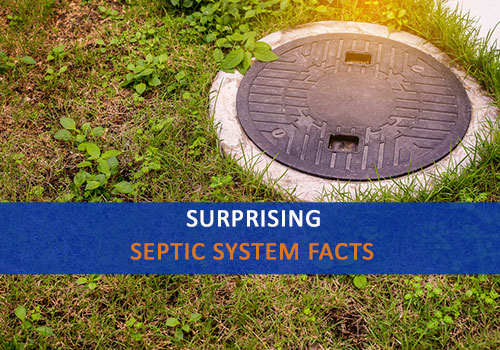The more you know about your septic system, the better prepared you are to maintain and manage your septic. That includes knowing some surprising septic system facts.
With your septic doing the hard work underground, it leaves an air of mystery surrounding it. After all, if you can’t see something work, it’s hard to know what’s going on down there.
Enter the experts! We are here to take the mystery out of your septic system and maybe surprise you with a few things you didn’t know about your system.

Surprising Septic System Facts
Ready to wow your friends at trivia (that is, if septic is ever a category)? Time to commit these septic system facts to memory.
1) Your System is More Than Just Your Tank
While the septic tank gets a lot of the glory (and maintenance), it’s not the only part of your system.
Oddly, this is one of the septic system facts that most folks don’t know.
Your septic system is just that — a system! It starts with the toilets, sinks, drains, and pipes in your home that whisk wastewater down into your septic tank. From there, it includes the pipes that push water into your drain fields. And it even includes the soil surrounding and underneath your leach field.
2) Your Septic Tank is a Gross, Liquid Cake
Septic tanks have layers, like a tasty birthday cake! That is where the similarities end…
Septic tanks work by creating different layers to draw out solids and push treatable wastewater through the rest of your system. The bottom layer consists of a solidifying sludge layer made up of solid waste, toilet paper, and other non-degradable items. The middle layer is a mixture of solids added to the sludge and solids being broken down by bacteria. The top layer is the wastewater ready to be flushed into the leach field for its final treatment.
So maybe it’s not a cake, but it has layers just like one.
3) Your System Runs On Good Bacteria
Many people think of bad bacteria when they think of waste. This is accurate — waste can be a cesspool for harmful bacteria. It’s why waste treatment systems exist in the first place.
But, your septic tank requires good bacteria to function.
The bacteria in your tank feast on solid wastes, helping break them down through digestion into gases. They also reduce the amount of solid waste added to your sludge layer, which helps keep your tank efficient and avoids early pump-outs.
So don’t worry when you hear your septic technician talking about bacteria. It’s a good thing!
4) Your Septic Tank Contents Can Tell Us A Lot About Your Home
One of the more surprising septic system facts — the contents of your tank can tell us about your home.
During a pump-out and tank inspection, we see a lot, including all the things that you’ve put into your tank. So we know if you are bad about using your garbage disposal like a trash can and if you drink a lot of coffee (hello, coffee grounds). We can tell if you have a house full of girls as we will see more toilet paper. We know if you have a cat if you’ve been flushing your kitty litter.
While the eyes are a window to the soul, the septic tank is a window to the home.
5) Your Septic System is Fragile
While it has a tough, dirty job, that doesn’t mean your septic is tough. In fact, it’s pretty sensitive.
Small amounts of bleach and chemical cleaners can kill off the good bacteria and hurt your system. Too much rain can clog up your drain field. Parking your truck on your drain field, planting trees, and determined, digging dogs can damage the drain field pipes.
Treat your septic system with care; it needs it!
6) Your Septic Can Affect the Groundwater
The last step of wastewater treatment in a septic system is its filtering through the drain field’s soil. Once filtered, it enters the water table.
So, if your system isn’t running efficiently or needs repairs, untreated wastewater will enter the groundwater. Too much untreated wastewater and it leads to contamination.
7) Maintenance Can Prevent Septic Repairs
The best way to avoid costly repairs? Maintenance!
This includes pump-outs when needed, following do-not flush rules, limiting water use during storms, and treating your system with care. A little effort can go a long way in preserving the life of your septic system.
Florida Septic Repair and Maintenance
Were you surprised by these septic system facts? Not anymore! Knowledge is power when it comes to maintaining and preserving your septic system.

